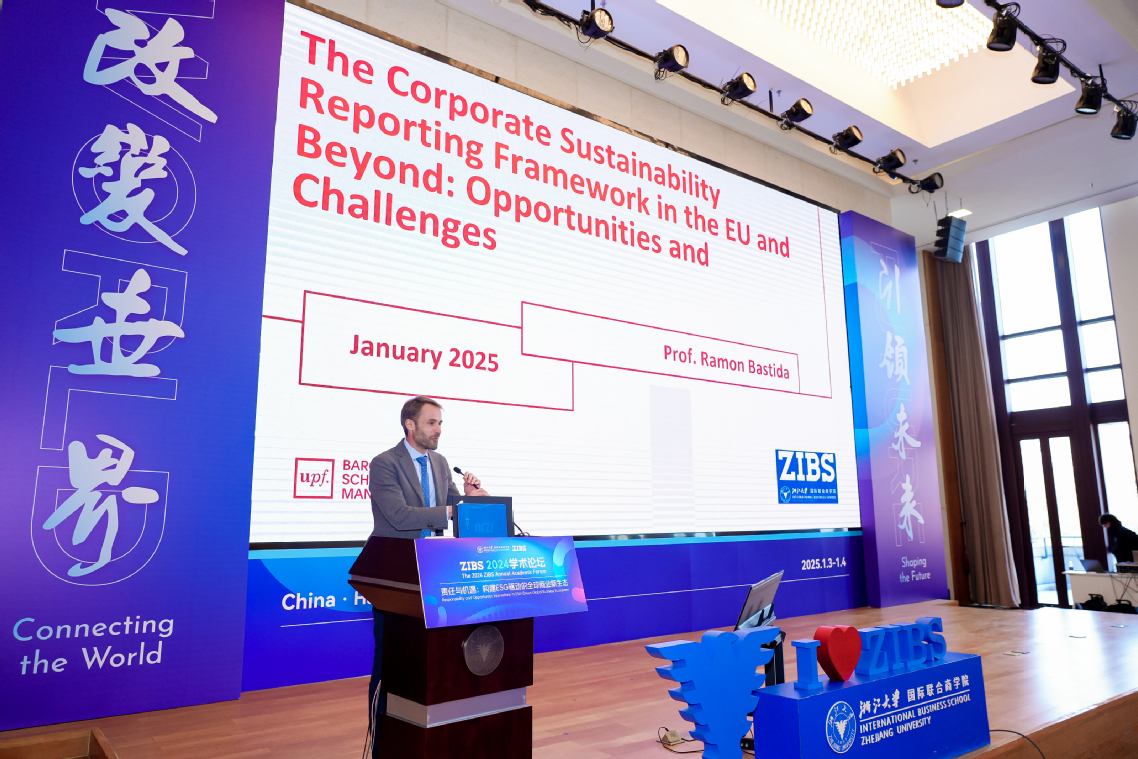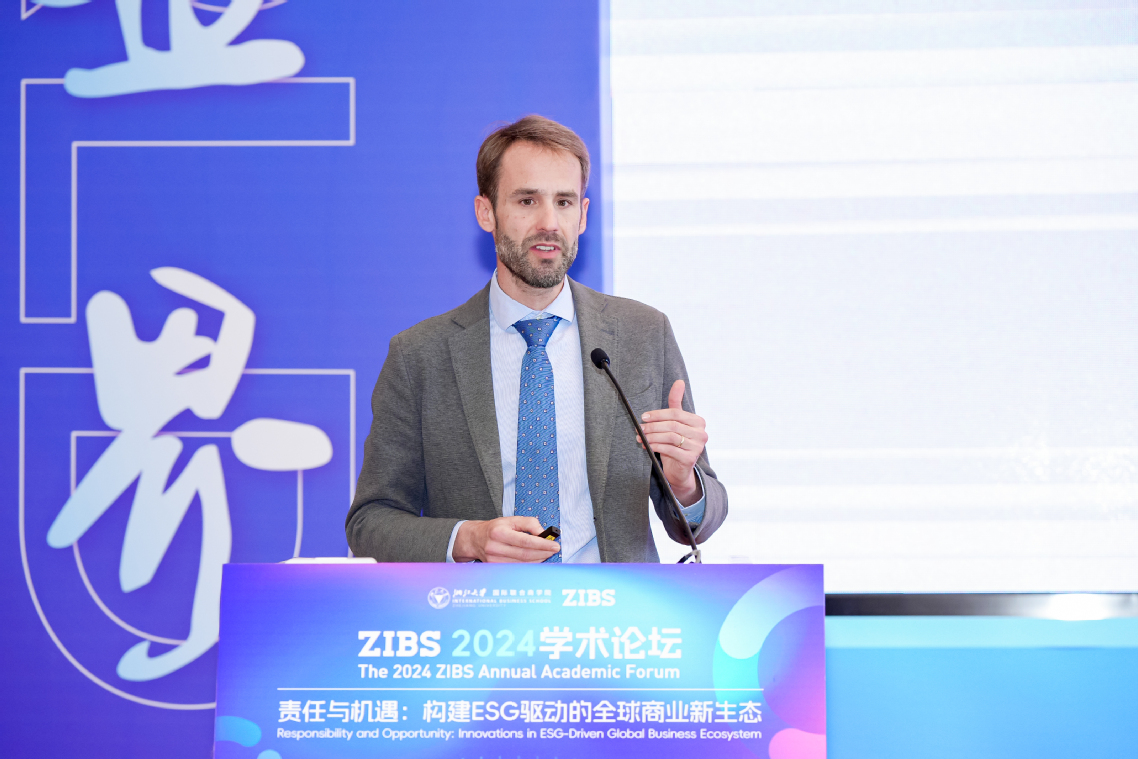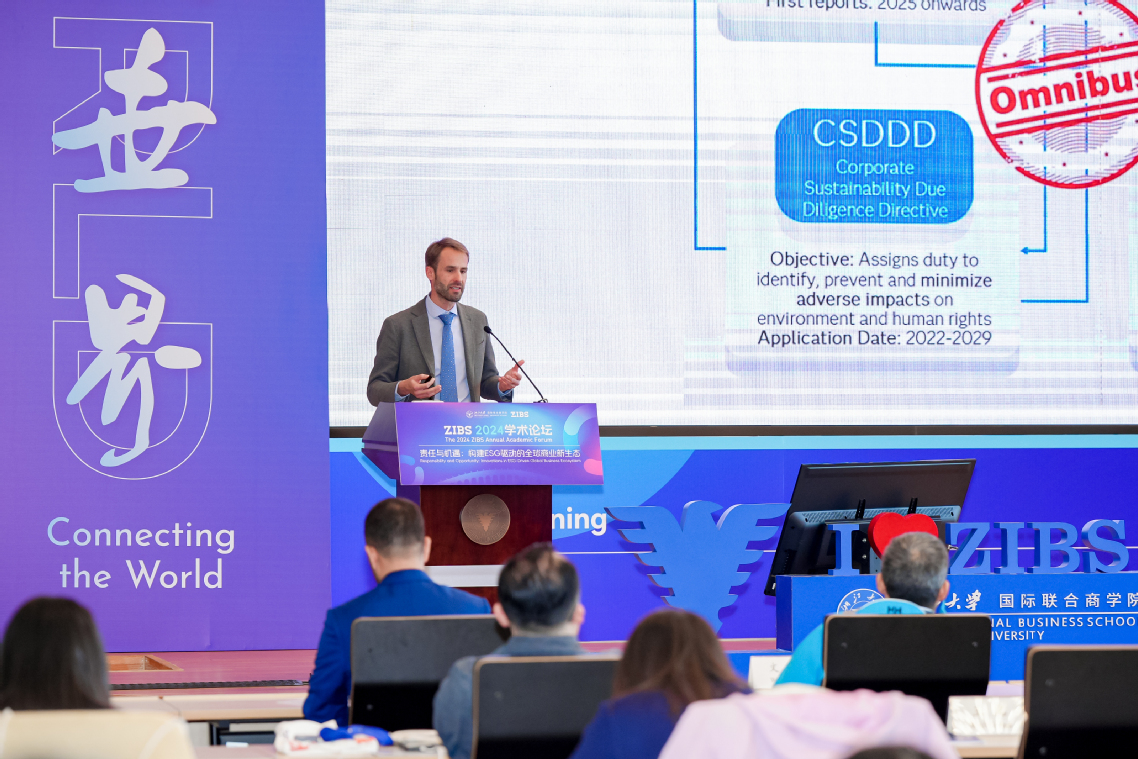At the beginning of January, the 2024 ZIBS Annual Academic Forum, themed Responsibility and Opportunity: Building an ESG-Driven Global Business Ecosystem, was successfully held in the International Campus. The forum delved into cutting-edge topics such as data intelligence, environmental science, fintech, digital innovation, and corporate renewal. It aimed to share the latest research findings, innovative ideas, and practical experiences, offering profound insights and strategies for the sustainable development of global business, technology, and education.
This issue of the ZIBS Insights spotlights the speech delivered by Ramon Bastida, Associate Professor at the Department of Finance and Control at UPF-Barcelona School of Management (UPF-BSM), Director of International MBA Full Time Program. He presented an insightful exposition on the topic of corporate sustainability reporting framework in EU and beyond. Below is a summary of the key points.

Understanding the context: Sustainability in an interconnected business playground
The European Union has introduced a series of regulations and standards to address global challenges and promote sustainability. Businesses today operate in a highly interconnected world, where supply chains span across countries, creating both opportunities and risks that impact communities and the environment. Global capital markets are increasingly prioritizing sustainable companies, while professionals seek careers that not only offer competitive salaries but also align with their sense of purpose. A healthy planet is essential for business, as environmental issues in one region can have far-reaching effects elsewhere.
As part of its green initiative, the EU has set ambitious goals, including reducing carbon emissions by 55% by 2030 and achieving climate neutrality by 2050. These efforts also focus on protecting biodiversity, preserving natural resources, and fostering clean technologies. Importantly, the EU emphasizes an inclusive transition, ensuring no one is left behind in this economic transformation. Since 2019, over 150 directives have been introduced across key areas such as energy, transportation, land use, water, and chemicals, all aligned with the European Green Deal. These measures present significant challenges for businesses but also pave the way for innovation and a more sustainable future.

Implementing Sustainability Standards: A Global Approach
Efforts to promote sustainability in finance and investment have led to significant regulatory advancements within the European Union. These initiatives aim to redirect cash flows toward environmentally responsible investments, beginning with two cornerstone regulations: the European Taxonomy, which defines sustainability criteria, and the Sustainable Finance Disclosure Regulation (SFDR), which provides a framework for classifying and disclosing investments. These measures set the stage for greater transparency and informed decision-making in sustainable finance.
Under this framework, European companies are required to disclose detailed information not only about their own operations but also about those within their supply chains. This ensures accountability across the value chain, even for suppliers operating outside the EU, aligning their activities with European sustainability standards. The integration of sustainable and financial data is a key component, enabling both investors and companies to manage resources effectively and responsibly.
Previously, sustainability reporting was based on fragmented and largely voluntary standards. However, the EU has streamlined these into mandatory frameworks for member states, consolidating global standards into a unified approach. The regulations apply to large corporations and small to medium enterprises embedded in the value chains of large corporations, requiring data on environmental metrics such as carbon emissions and water usage. By fostering transparency and accountability throughout the value chain, these measures are driving businesses toward practices that align with sustainability objectives.

Sustainability and Corporate Strategy: Challenges and Opportunities
Businesses are now required to disclose their carbon footprint, have it verified by third parties, and outline their transition plans for reducing emissions by 2025. The financial implications of carbon emissions are considerable, as illustrated by Ryanair's carbon credit costs, which surged from 51 million in 2022 to 690 million in 2024. This sharp rise highlights the economic motivation for companies to mitigate their environmental impact.
However, sustainability should not be viewed merely as a compliance requirement. Companies that take the lead in sustainability are achieving significant benefits, including increased revenue, access to new markets, more favorable capital conditions, enhanced efficiency, and cost savings. Despite these advantages, integrating sustainability into corporate strategy poses challenges for many European businesses. Key areas of focus include adhering to regulations, staying informed about environmental taxation changes, understanding sustainability limitations, and adapting to new rules on plastics and carbon emissions.
Conclusion
While the economic and regulatory pressures to adopt sustainable practices are evident, companies that embrace sustainability as part of their core strategy stand to gain significant advantages. By addressing challenges such as compliance, taxation changes, and new environmental regulations, businesses can unlock opportunities for growth, efficiency, and market expansion, positioning themselves for long-term success in a rapidly evolving landscape.
*This article is based on the speech made by Ramon Bastida at 2024 ZIBS Academic Forum. The views and opinions expressed in this article are those of the speaker and do not necessarily reflect the views or positions of ZIBS.
Ramon Bastida Vialcanet is currently an Associate Professor in the Department of Finance and Control at UPF-BSM, where he also serves as Director of the International MBA Full-Time Program. Holding a PhD in Business Administration and Management and a master's degree in accounting and financial management, his research interests focus on sustainability, ESG reporting, and the integration of social and environmental dimensions into organizational practices. He has published extensively in top-tier journals and is a recognized voice in the media on topics such as the European Sustainability Reporting Standards and corporate sustainability strategies.




